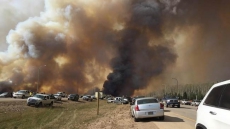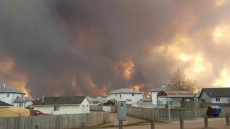RICHMOND, B.C. — In the market for 350 marijuana grow lights, 50 air ventilators or two dozen giant fans? You're in luck.
More than $1 million worth of equipment inside a defunct medical cannabis producer's former 6,100 square-metre facility in Richmond, B.C., will be auctioned off on Thursday.
MediJean's closure draws attention to the costly risks of launching a pot-production business, observers say.
Former chief operating officer Chris Dollard said he left the company before it closed, but he believes Health Canada rejected its application to be a licensed producer.
"We were waiting, waiting, waiting. That's what Health Canada does. They keep you waiting until you run out of money," he said. "It's pretty clear that if they had been accepted, they'd be in business."
Dollard said companies have to hire staff, buy equipment and establish operational facilities before Health Canada can approve their applications, a process that takes years. He would not say how much MediJean invested but said aspiring producers should have $10 to $12 million available.
Former MediJean CEO and namesake Jean Chiasson did not return calls seeking comment.
There are currently 31 licensed producers in Canada. As of March 2015, some 1,284 applications had been received, of which 324 were in progress, according to Health Canada's website.
"Licences are only issued once all regulatory requirements are met," it says. "Each application undergoes a detailed assessment, including in-depth security checks led by the RCMP and site inspections."
Health Canada did not respond to requests for comment.

Colette Rivet, executive director of Cannabis Canada Association, which represents more than half of Canada's licensed producers, said it's a well-known fact in the industry that the approval process is lengthy and costly.
Health Canada must conduct extensive quality and safety checks to ensure the product won't be sold on the black market and that public health is protected, she said.
"I think that's important. Maybe they do require more resources to do it on a timely basis, but when an industry evolves, sometimes you can't keep up with all the demand."
Justin Dhaliwal, CEO of National Green Biomed, said the B.C.-based company applied in August 2014 for approval from Health Canada and is still waiting, but it anticipated the process would take years.
He said ways to minimize the risks associated with starting a medical marijuana production business include having a credible team that will pass background checks and building a facility to the exact specifications provided to Health Canada.
"If you can tick off all those check marks that Health Canada requires you to do, there's no reason for them not to issue you a licence."
In February, a Federal Court judge struck down the 2013 legislation that required patients to buy from licensed producers and gave the federal government until August to amend the law to allow patients to grow at home.
Licensed producers are still waiting to see how the amendments, as well as the Liberal government's separate pledge to legalize recreational marijuana, will affect their businesses.
Able Auctions president Jeremy Dodd said the MediJean building was sold with its contents and that the new owners, a furniture company, are auctioning off everything. He said he expects the items to fetch 30 to 40 cents on the dollar.

Dodd said Thursday's auction also allows for online bidders and he has seen interest from across Canada and Washington state, where recreational marijuana is legal. But he noted the equipment could be used in greenhouses or research laboratories.
"Thirty years in the business, I have never seen anything like this," Dodd said. "It's just a strange situation to see this kind of product being sold at this point in time.
"When you invest this kind of money to get an operation set up, it's rare it closes down this quickly."


